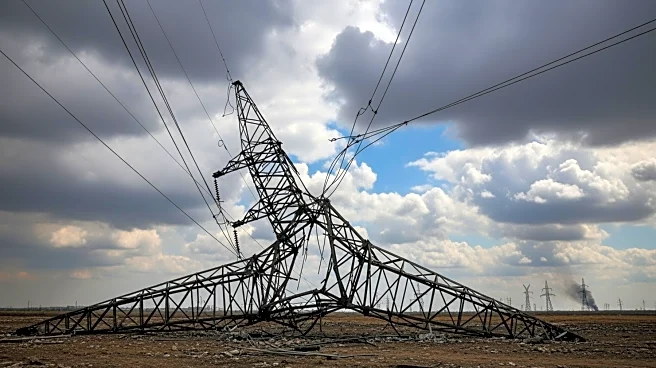What's Happening?
In a recent escalation of hostilities, Russian forces have targeted Ukraine's energy infrastructure, leading to significant power outages across several regions. The attacks, which included drone and missile strikes, have particularly affected the Zaporizhzhia
region, leaving nearly 60,000 residents without power. The Odesa region also suffered from a drone attack that resulted in the deaths of two individuals and injuries to three others. These strikes are part of a broader Russian campaign aimed at crippling Ukraine's energy systems as winter approaches, thereby impacting essential services such as water, sewage, and heating.
Why It's Important?
The ongoing attacks on Ukraine's energy infrastructure have severe implications for the country's civilian population and its ability to sustain essential services. As winter nears, the lack of power could lead to humanitarian challenges, affecting heating and water supply systems. The strikes also aim to undermine Ukrainian morale and disrupt the country's war-related activities, including weapons manufacturing. This strategy reflects a shift in Russian tactics, focusing on specific regions and infrastructure to maximize disruption. The situation highlights the vulnerability of critical infrastructure in conflict zones and the broader geopolitical tensions between Russia and Ukraine.
What's Next?
As the conflict continues, Ukraine may seek to bolster its air defenses to protect critical infrastructure from further attacks. International support, both in terms of military aid and humanitarian assistance, could play a crucial role in helping Ukraine manage the crisis. The ongoing strikes may also prompt further diplomatic efforts to de-escalate tensions and seek a resolution to the conflict. Meanwhile, the Ukrainian government will likely focus on restoring power and ensuring the continuity of essential services to mitigate the impact on civilians.
Beyond the Headlines
The attacks on Ukraine's energy infrastructure raise ethical and legal questions about the targeting of civilian infrastructure in armed conflict. Such actions could be seen as violations of international humanitarian law, which prohibits attacks on objects indispensable to the survival of the civilian population. The situation also underscores the need for international mechanisms to protect critical infrastructure in conflict zones and the importance of resilience planning to withstand such disruptions.















